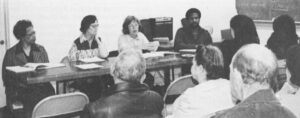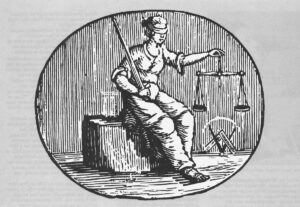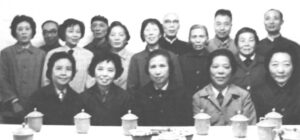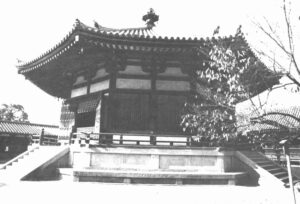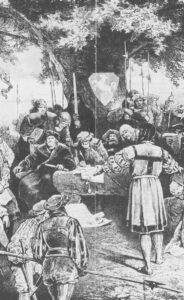
The Bettmann Archive, Inc.
(CAMBRIDGE, ENGLAND) — The medieval warren of buildings along the narrow Cambridge street known as Petty Cury was obliterated during the last decade to make room for a starkly modern commercial complex of glass, steel and brick. But the top floor, which opened this spring, was reserved for an institution whose origins are no less medieval than the townscape that had been swept away — a Magistrates’ Court. It is presided over by judges who are not lawyers, who serve without pay and who spend their non-judicial hours working as postmen, nurses, teachers and janitors. They are Britain’s Justices of the Peace, and the readiness of the urban planners in Cambridge to save a place for them in the new architectural order attests to the vital role that the lay person still plays in that nation’s criminal justice system.
The contrast with the United States could hardly be greater. The non-lawyer American JP has become an almost derisory figure, a pathetic vestige of a once important public office. The very name calls to mind some untutored rustic battening on the proceeds of a highway speed trap. But in England and Wales the lay justices are respected officials who shoulder more than 98 percent of the criminal caseload. The English example may suggest ways in which our own court system could profitably be reformed by making the man in the street the man on the bench.
The survival of the JP typifies the British knack of rehabilitating traditional forms of government and making them serviceable for the modern age. The JP has been sitting in judgment since 1381, succeeding an earlier officeholder known as the “keeper of the peace” The Tudor monarchs relied on the JPs to enforce a wide range of royal decrees, from the poor laws to regulations for running ale-houses. They were generally members of the local squirearchy in each county, landowners who earned a tough reputation for their sentencing of poachers. Later, merchants and entrepreneurs filled the bench. But after World War I it was broadened to include men — and the first women — of humbler rank. Today 24,000 persons wear the coveted initials JP after their name. So prestigious is the designation, in fact, that London’s College of Arms, the arbiter of titular protocol, ruled last year that it must precede all degrees and professional qualifications.
The JPs are appointed by the Lord Chancellor, a Cabinet official who heads the British judiciary, and serve until they reach the retirement age of 70. They receive no salary or other tangible rewards. There are no educational requirements. Apart from a few hours spent attending lectures and observing court hearings, their training could fairly be described as on-the-job.
Yet their powers are considerable. Nearly two million defendants come before them each year. Although driving offenses are numerically the major part of their work, they hear about 800,000 cases involving such crimes as breach of the peace, forgery, handling stolen goods, weapon offenses, burglary, sexual crime and drug violations. They impose fines of up to 1,000 pounds (about $2,200) and prison sentences of up to six months. In the more serious cases, the JPs decide whether the defendant should be held in custody for a jury trial or whether to grant bail. They also function as a family and juvenile court.
Collectively, the JPs represent a triumph of the amateur spirit over the seemingly inexorable rise of professionalism. The cost of professionals is one reason for preserving the lay bench. The free service that JPs offer has been a boon to the public treasury, earning them the fond nickname of “the Great Unpaid”. Besides, the British believe, it would be difficult to hire enough capable lawyers in a country with a relatively small legal profession to replace adequately the services of the thousands of conscientious volunteers, donating half a day every week or two. A former Chief Justice, the late Lord Parker of Waddington, expressed that belief when he remarked of JPs: “I am convinced that voluntary labor is better than badly paid labor. ” A leading barrister, Louis Blom-Cooper, adds that “even in a highly industrialized country there is a place for public service freely given. One can overdo professionalism.”
The argument for JPs, however, goes beyond practicality. There is an underlying sentiment that the presence of the layman on the bench has a beneficial effect: it prevents the function of meting out justice from being monopolized by a professional elite. “In this country,” explains Trevor Spicer, the Assistant Secretary of Commissions in the Lord Chancellor’s Office, “we have the idea that each man is to be tried by his peers, and the JPs are chosen to represent a cross-section of the community. So you feel you are being tried by a person not too far removed from the facts of ordinary life.”
The JPs are proud of their non-professional outlook, which they believe promotes fairer justice. “We’re dealing with people who are less fortunate, who are socially deprived,” said one. Sometimes you can’t imagine how they got themselves into the mess they have. But at least we’re closer to the man in the street. We come in here once a week. The judge is doing this day in and day out. So we bring a fresher approach.” A female JP said: “We bring a much more compassionate view of problems, such as those of depressed women. Some judges’ decisions show absolute insensitivity to such problems.”
The effectiveness of the JPs in improving the quality of justice, if not the quantity, is demonstrated by the reluctance to raise the number of “stipendiary magistrates”. They are a small group (about 50) of full-time, salaried lawyers who sit as a one-man bench in London and in some other large cities to help cope with the workload. (The JPs generally sit as a three-person panel.) Responding to suggestions that more stipendiaries be hired, Lord Chancellor Hailsham once argued that “for sheer competence, for getting through seventy cases or so in the course of a morning’s work there is of course, nothing to touch them.” But, he added, “the public do not like their cases being dealt with at the rate of about seventy a morning … They do not like to feel that justice is administered like a production line in a factory.”
Defendants who have a choice of being tried in Magistrate’s Court or by a jury in a full-fledged trial court very often choose the JPs. They may believe that it will end the ordeal more quickly or result in a lighter sentence. For whatever reason, it is a remarkable display of consumer satisfaction. The JPs also get high marks from a rather different quarter: judges of appellate courts. In only a few thousand of the two million cases is the decision of the JP disturbed on appeal, and only a few dozen decisions are overturned on points of law. Parliament gave a vote of confidence to the JPs in 1977 when it decided, on the advice of a high-level study committee, to relieve the judge-and-jury courts of some of their workload by making more crimes triable in Magistrates’ Court.
The JPs’ effectiveness is probably partly attributable to the help of the “justices’ clerk,” a paid official who gives the bench legal advice. The clerk is sometimes regarded as a gray eminence who subtly keeps the JPs under this thumb. But that notion is disputed by Frank Gonning, a veteran clerk who now serves as an advisor to the Home Office, which administers the Magistrates’ Courts. “The clerk tells them what they can do,” says Gonning, “and they decide what they want to do. The vast majority of the court’s business is common sense. “
Since 1960 only solicitors or barristers have been appointed to clerkships, a concession to professionalism that Gonning regrets. Gonning is a member of the old school that learned its law from the ground up; he started as an office boy in a Magistrates’ Court. Tapping a blue-bound volume of Stone’s Justices’ Manual, the JP’s bible, he recalled that “I used to stay awake nights reading until I knew this backwards.”
The non-professional bench does draw some criticism for the way it conducts the court’s business and for the decisions it reaches. Barrister Blom-Cooper, who served in a lay capacity on a London bench for 12 years, faults them for a lack of what he calls “court craft,” the ability to keep tight control of the proceedings and handle obstreperous lawyers. Martin Wright, the director of the Howard League, a respected prisoners’ rights group, believes that they send too many defendants to jail. Jenny Levin, co-director of the Legal Action Group, which represents poor persons, finds that magistrates are too ready to accept unquestioningly evidence offered by the police and to depart from the strict rules of evidence.
Yet none of these critics, significantly, favors abolishing the lay bench in favor of professionals. At most, they want reforms. A frequently heard proposal is that the bench be made even more socially diverse by reducing the number of “establishment types” and appointing more younger (under 40) persons, persons from working-class backgrounds and members of racial minorities.
Such proposals touch on a sore point. The magistracy prides itself on having been democratized since the days when it was the preserve of the landed gentry. Because no government agency published a full demographic profile of the JPs, the representativeness of the group is difficult to measure precisely.
The main criteria for selection, according to Trevor Spicer of the Lord Chancellor’s Office, are character, integrity and understanding. “We are keen on motivation,” he says, “but we don’t want extreme views of any sort — someone riding a hobby horse.” A good mix of age, sex and background is an acknowledged goal, although it is evidently more difficult to find wage earners who can leave their jobs to attend daytime court sessions.
Certainly, the magistracy is among the least sexist judiciaries of any country; fully one-third of the JPs were women by the mid-1970s, according to the Magistrate’s Association, a kind of JP’s trade union. Yet some feminists claim they are mainly women of the traditional mold — “the colonel’s old lady,” as one put it.
Oddly enough, the selection process is overtly political, in the sense that the Lord Chancellor’s Office consciously attempts to maintain a balance on the bench among supporters of the Conservative, Labour and Liberal Parties. The recruitment of Labour Party members has helped somewhat to overcome the class barrier between the judges and the judged. But “they tend to get fairly reactionary trade unionists,” says Martin Wright of the Howard League. “Those who come from working-class backgrounds,” Mr. Blom-Cooper agrees, “are quite the most punitive.”
Doubts about the composition of the magistracy are heightened by a selection process that is largely secret. Nominations are sent to the Lord Chancellor by about 100 advisory committees throughout the country whose membership, except for the secretaries, is not disclosed. Mr. Spicer, who keeps track of appointments with colored pins on a wall map, defends the secrecy as necessary to spare committee members from lobbying by applicants. Besides, he says, “We prefer to think of people being recommended rather than volunteering.”
The recommendations that count the most are those that come from the committee members themselves or other JPs, according to a recently published study by Elizabeth Burney, a British researcher. In addition, she found, “Doctors nominate other doctors, teachers other teachers. Sport clubs nominate their secretaries or, in Wales I am told, their former Rugby stars. Churches nominate their choir masters.”
Do the British JPs offer an example from which the United States can learn? The early Americans were hostile to the notion that lawyers possessed judicial attributes superior to the ordinary man. The Framers of the Constitution studiously neglected to make legal training a prerequisite for membership on the U.S. Supreme Court, and as late as 1818, the highest court in one state, Rhode Island, had a blacksmith on the bench.
But when the American bar began to expand and professionalize in the late 19th century, non-lawyer judges came under attack. The Progressive reformers argued caustically that JP stood for judgment for the plaintiff.”
Lay courts have endured in some form in 44 states but their competence has been so impugned that they have been left only a remnant of their former powers. By 1979, a Federally financed study by the National Center for State Courts and Institute of Judicial Administration, was able to conclude that “elimination of the justice of the peace may be only a matter of time.”
However, the study did hold out a glimmer of hope. It noted the paradox that “Just as their demise seems possible… lay judges may be getting a reprieve.” Salvation came in the form of a 1976 U.S. Supreme Court ruling in the case of North v. Russell, which upheld the constitutionality of lay judges. Some defendants had argued that trial before a non-lawyer violated their Fifth Amendment and Fourteenth Amendment rights to due process of law.
At the same time, there has been a growing recognition both within and outside the legal profession of the need for more informal, speedier mechanisms than the regular courts provide for resolving minor disputes. Earlier this year, the President signed the Dispute Resolution Act, which will provide state and local governments with funds to create experimental mechanisms of this kind. Many of the proposals for alternative mechanisms include “non-adversarial” methods, in which the conflicting parties are brought into consensual agreement — methods such as mediation. Under such methods, the premium would not be on the judge’s knowledge of the law but upon his knowledge of the community, his acceptability to the conflicting parties and his understanding of the subjects in dispute.
This sounds much like the classical description of the JP, as some judicial reformers are beginning to realize. They are thus taking a second look at the traditional lay adjudicator before he becomes an extinct species. And they are pondering the English magistracy as if it were the road not taken but which might be taken now. For example, a member of the House Judiciary Committee, Tom Railsback of Illinois, urged Congress during the hearings on the Dispute Resolution Act to acquire a “body of expertise on the English system”.
Obviously, because of constitutional and social differences between the two countries, a simple transplant of the British JP is unlikely. But the British experience does prove, in principle at least, that the layman can still exert a useful, humanizing influence on the administration of justice. The force of the British example, as one official of that country observed, is that “it works, and it works well.”
A Morning in Magistrate’s Court
It is the morning sitting of the Cambridge Magistrate’s Court. The hearings take place in a high-ceilinged, softly lit courtroom, whose spacious lobby is decorated with plants and cheerful upholstery. The JPs settle into swivel chairs at a raised bench covered with green nap fabric. On the wall behind them is a huge royal crest in bas-relief. Only the court usher wears a black robe. The bench includes two women, who in private life are a doctor and a nurse. A man in a gray business suit is the chairman, a position for which at least 10 years of experience as a JP is required. When not on the bench, the chairman works as a “porter” or doorkeeper in a college.
The atmosphere is relaxed and informal but not casual. The panel speaks only through its chairman, as is customary. (The custom won the silent partners on either side the jocular title of “bookends.”) Decisions are made by majority vote, although dissenting opinions are not voiced outside the JPs’ conference room.
Three cases are on the mimeographed court calendar. In the first, the defendant is charged with drunken driving. A policeman testifies that he has failed the breathalyzer test. The defense lawyer, who addresses the JPs as “the bench” and the prosecutor as “my friend,” objects on a technical point: the defendant had been arrested under the wrong subsection of the statute. He was thus “entitled to be acquitted because that is the law,” the lawyer argues.
The magistrates retire through a side door to the conference room, taking with them their clerk. When they return 10 minutes later, the chairman announces that “we uphold the defendant’s motion to dismiss on the grounds that he was charged with the wrong offense.” But they pointedly deny the defendant’s application to have his court costs paid — evidently because they believe, apart from the technicality, that he deserves to be convicted.
The next defendant is a woman named Rose, who is confined to a wheelchair. She is charged with acting in an abusive and threatening manner in a restaurant after being told that she could not smoke there. This is her second appearance on that charge. During the first, she grabbed at spectators as she was wheeled down the aisle, and eventually passed out, apparently drunk. This time the spectators are cleared from the aisle seats as the matron wheels her in. She is dressed in a nightgown and has her head buried under a blanket.
The clerk tries to get her attention. “Look at me, Rose,” he says soothingly. “Let me see your eyes.” Without lifting her head, she mumbles through the blanket, “Why should I? You’ve already made up your mind.” The clerk persists. “You could be a friend of mine,” he says. After some minutes of coaxing, Rose tells her side of the story. “One minute they give you permission to smoke, then they change their mind,” she snarls. “So I got angry.”
The prosecutor acknowledges that “it obviously was a misunderstanding, and we’ll leave it at that.” The chairman advises Rose that she can avoid a penalty by pledging to behave herself in public from now on. “Does it mean I have to go to the police station every day?” she asks. No, she is told, and she agrees. “Then you will be bound over to keep the peace for 12 months in the sum of 20 pounds,” the chairman declares. “That means if you misbehave, you’ll lose the 20 pounds. Is that clear to you, Rose?” She nods meekly.
The last defendant is John, a middle-aged alcoholic with 60 previous convictions. The calendar lists him as N.F.A. (no fixed abode). Wearing a shabby tweed overcoat and coughing, he listens to the charge that he did “beg alms” on St. Andrews Street.
The chairman asks where he lives, and he replies that he sleeps in the back of a Catholic Church. “Are you under cover,” the chairman inquires. “Yes, sir” John says.
The clerk reminds the JPs that it is within their power to find him an “incorrigible rogue,” a habitual offender designation that could lead to imprisonment. But after the JPs make a brief excursion to the conference rooms, the chairman tells John, “Well, you are returning far too often. You will be fined 10 pounds. However, we are not of a mind on this occasion to convict you of being an incorrigible rogue.”
There is a further complication. When he was arrested, John had only two pounds in his pocket — not enough to pay the fine. The JPs whisper to each other momentarily. The chairman says that John need make only a down payment of one pound; the rest could be made up in weekly payments. To keep John out of prison, the court has fashioned an installment plan.
©1980 Richard V. Denenberg
Richard V. Denenberg is investigating “Alternatives to Traditional Courts.”

